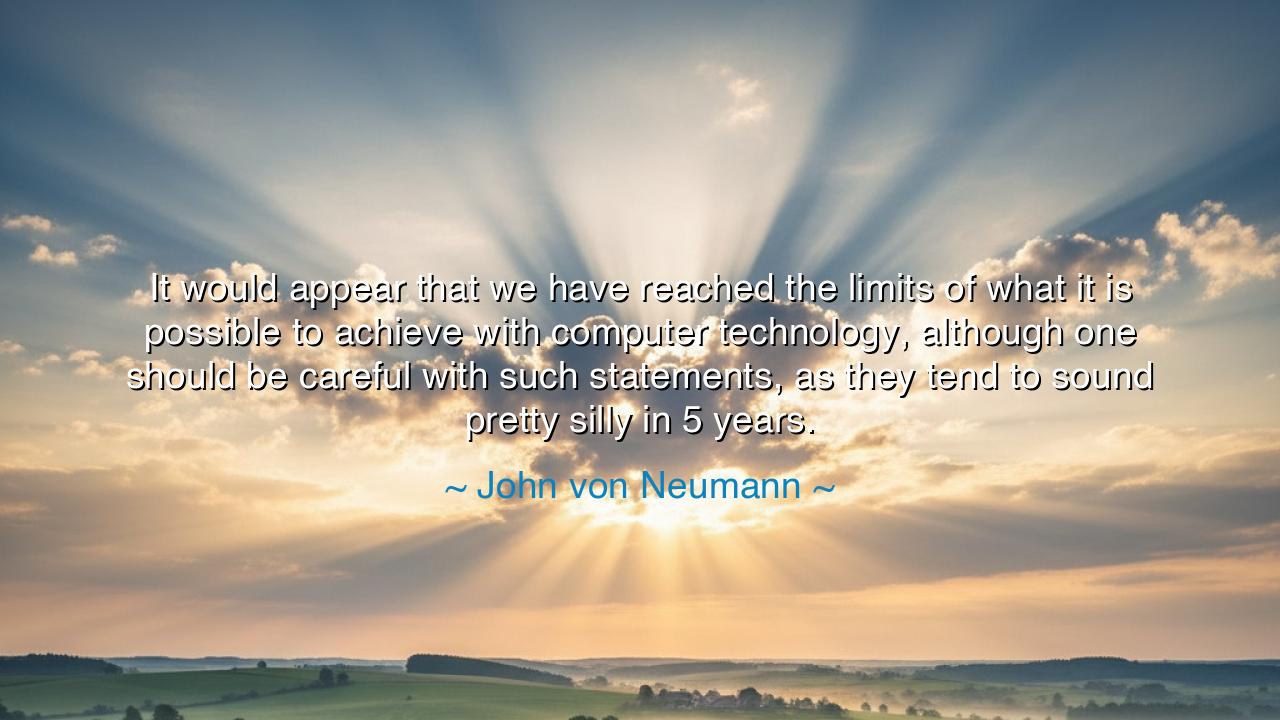
It would appear that we have reached the limits of what it is
It would appear that we have reached the limits of what it is possible to achieve with computer technology, although one should be careful with such statements, as they tend to sound pretty silly in 5 years.






Hear now the words of John von Neumann, a titan of intellect whose mind shaped the very foundations of modern thought: “It would appear that we have reached the limits of what it is possible to achieve with computer technology, although one should be careful with such statements, as they tend to sound pretty silly in 5 years.” In this utterance lies both humility and foresight, the recognition that human reason, however great, often fails to grasp the endless horizons of invention. For whenever man proclaims a final boundary, time itself rises to laugh at his presumption, and new wonders emerge from the unseen depths.
The origin of this wisdom springs from von Neumann’s own era, when the newborn computer technology of the mid-twentieth century seemed already a marvel too great to surpass. Men of learning stood in awe before machines that filled entire rooms and performed calculations faster than any scholar with pen and parchment. Yet in the intoxication of such progress, there arose a temptation: to think the summit had been reached, that no higher mountain could stand beyond. Von Neumann, though dazzled by these machines, warned with a smile that to declare an end to discovery is folly, for in five short years the impossible often becomes commonplace.
History itself bears witness to this truth. In the age of flight, when the Wright brothers first lifted into the skies, there were wise men who declared that heavier-than-air machines could never become practical. Yet scarcely a decade passed before squadrons of planes filled the heavens in war and in peace. In the realm of science, Lord Kelvin once proclaimed that there was nothing new to discover in physics, and soon after came the revelations of relativity and quantum theory. So too in technology, each claim of finality has been shattered by the relentless march of human ingenuity.
And what has become of von Neumann’s warning? Look upon our present age. The machines that once filled halls now rest in the palms of our hands. Calculations once deemed miraculous are performed by children’s toys. The limits of yesterday are the stepping-stones of today, and the path stretches ever onward. Who could have foreseen the rise of artificial intelligence, where machines now compose music, paint visions, and even converse with human beings as if alive? Truly, to declare the end of progress is to write one’s words upon the sand, for the tide of innovation will wash them away.
Yet let us not mock those who err in predicting limits. Their words, though wrong, remind us of a deeper truth: that man’s imagination often lags behind his potential. Our danger is not in failing to dream too little, but in failing to believe that dreams can expand beyond the horizon. Von Neumann’s caution is thus a call to humility, a reminder that each age is but the foundation for the next. What we call impossible today may soon be woven into the fabric of daily life.
What lesson then must future generations draw from this? It is this: never chain the future with the doubts of the present. Hold your predictions lightly, for time is a greater teacher than pride. Do not say “this cannot be done,” but rather, “how long until it is achieved?” For the history of mankind is a history of boundaries broken, of walls shattered, of horizons extended further than thought dared to hope.
Therefore, let your actions be thus: approach every new challenge with open mind and bold spirit. When faced with skepticism, remember the laughter of history. When you are tempted to believe that the pinnacle has been reached, recall the words of von Neumann and prepare yourself to be astonished. Above all, cultivate humility—the humility that admits our knowledge is never final, our vision never complete. For in such humility lies the strength to keep moving forward, to keep discovering, and to keep proving the impossible possible.
So may you carry this wisdom: that the limits you see today are but illusions, and the world is ever greater than your imagination allows. Walk, then, not with despair at what seems impossible, but with expectation that the marvels of tomorrow shall make even your boldest dreams appear small.






AAdministratorAdministrator
Welcome, honored guests. Please leave a comment, we will respond soon